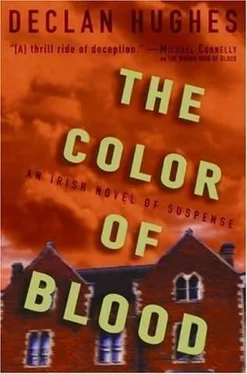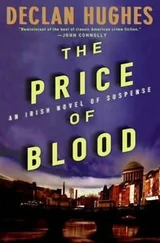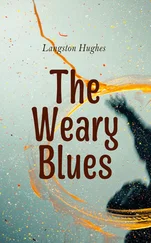I felt like I was getting nowhere; I couldn’t imagine what it would prove if David had rung anyone on my list. The green Jameson bottle behind the bar was flaunting its red crest at me again, and I was starting to give it the eye back. I thought of Tommy then, and how he had discovered the truth about his daughter Naomi by scrolling through the photographs on her phone. I wasn’t used to a phone that doubled as a camera, although it struck me that it would be quite useful, particularly for all that lovely divorce work that paid the bills and left me feeling so morally uplifted and optimistic for the human race afterward. I navigated from the menu to the picture gallery, opened the first folder and scrolled through the images. They were what I had been expecting: a series of women, including Emily and Maria Kravchenko, in sexual poses; there were a fair few of Brady and “the guys,” either in action on the rugby field or hoisting pints in what I now recognized as Seafield Rugby Club bar. Some images combined elements of both, though in a mildish form: girls flashing their tits for the guys, the guys flashing their bits for the girls. I experienced the kind of boredom and despair you normally associate with reality TV, and while one hand clicked faster through the images, the other was flexing itself in readiness for another shot of whiskey. So I was distracted, and three shots past the shot I wanted, and had to track back, and momentarily clicked myself out of the image gallery, and ended up having to start from the beginning and track through each image again, but finally I got to the shot I had begun to think I had imagined. There it was, two men and a boy having a pint together in the rugby club: Brock Taylor, Denis Finnegan and Jonathan O’Connor. Brock Taylor, who once worked for my da, and now had men shot to death for little or nothing, in Dublin, the city that shrank as you stared at it, until eventually, no matter who they were and what they had done, somehow, it all came back to you.
DENIS FINNEGAN’S OFFICES WERE IN MOUNTJOYSquare, about as far from the river on the northside of the city as Fitzwilliam Square was on the south. Before I left Dublin twenty-five years ago, you would have ended the comparison there: while there had been some major demolition and deterioration among the Georgian houses on the southside, not least on the adjoining Fitzwilliam Street, Fitzwilliam Square itself had survived relatively intact, whereas Mountjoy Square had been gutted, often without the demolished houses being replaced; vacant sites and derelict houses made it look like a cross between a bomb site and Skid Row. But the gold rush had changed the fabric of the city, for better or worse: Mountjoy Square fell firmly into the former category, with the gaps having been mostly filled either with restored originals or plausible facsimiles; it now looked like a square again, and tonight, high above the river, its park dense with shedding trees, the ashes already skeletal, in the swirling fog as a church bell struck one, it gave the impression simultaneously of being absolutely real in the concrete here and now, and an illusory dreamscape from the past, an ethereal evocation of times and lives now dead and done, as if whatever actions I might take, whatever my striving, it would be to the same end.
Finnegan’s house was on the north side of the square. He was as good as his word: hale and hearty, if a little drunk, he greeted me enthusiastically and led me up the stairs to a second-floor sitting room that overlooked the square and much of the city. The room was painted dark green, with a cream ceiling and a rich amber carpet; a gold chandelier with tulip bulbs hung from an ornate centerpiece; a turf fire seethed in the grate. Over chalk-stripe trousers, shirt and bow tie, he wore a peculiar-looking burgundy velvet smoking jacket brocaded in a faintly Turkish manner that looked like it had last seen use in a comic opera. He offered me a range of things from a groaning drinks table by one of the big sash windows; all I wanted was a bottle of Guinness, which was good for keeping the alcohol in the blood steady while not really counting as a drink. But since Finnegan was oiling himself with a ten-year-old Macallan, which may have had something to do with his face glowing a shade or two brighter than his jacket, I asked for one as well, and commandeered the bottle on the pretext of reading the label. I had such a number of things to charge Finnegan with that it was hard to know where to start, but I didn’t think asking him how many people in total he reckoned he had murdered was a great icebreaker. And the only one I was confident he had killed was Richard O’Connor, and that would be impossible to prove. But since I’d last seen Finnegan in south Dublin, indeed, looking like an exemplar of that zone, there was a time-honored city-sensitive way of kicking things off.
“So Denis, you’re here on the northside. What’s that about?”
“I made a little money in the eighties. These houses were tumbling down at the time, it was a civic disgrace. But it did mean you could pick one up for a song. I had it restored, over time-living on one floor while another was overrun with builders. And of course, I based my practice here.”
“During the eighties, the early eighties, while you were teaching in Castlehill School?”
“It would have been after that, about 1985.”
“You left in 1985? And what, you went back to university?”
“Oh no. I had already taken a degree and so forth, I just had to complete my apprenticeship. There weren’t many of us who hung around. But I had location on my side. Back then, before we had what the newspapers insist on referring to as ‘gangland,’ we just had a clutch of ordinary decent criminals. And the bulk of them came from within a stone’s throw of my door. Although, having represented many of the gentlemen concerned, I shouldn’t have considered it in the leastwise prudent to throw a stone at any of them.”
“You must have known them all at that time,” I said. “Lar and Shea Temple, the Flannery brothers, Brock Taylor.”
Finnegan nodded, as if we were reminiscing about some glorious rugby heroes of the past.
“Oh yes, Brian in particular. I brokered the settlement with the Criminal Assets Bureau on his behalf. Brian’s done well.”
“He’s done very well. House on Fitzwilliam Square, The Woodpark Inn, and he seems to be buying up half of the surrounding area.”
“Yes.” Finnegan nodded. His face had contracted into that Oriental rictus smile again.
“Why do you think he’s doing that? In that area particularly?”
“I wouldn’t really know. I suppose there’s council stock there still to be had relatively cheaply, he estimates that it’s the coming area, just on the Castlehill/Seafield border after all.”
“And he’s quite the man in Seafield Rugby Club as well.”
“Is that right?” Finnegan said.
“Is that right? Sure you know that’s right, aren’t you to be found there regularly? You and Jonathan? Sharing a drink with Brock?”
Finnegan put his drink down on a small mahogany side table and repositioned himself in his seat, uncrossing his legs and planting his tiny feet side by side on the amber carpet.
“Mr. Loy, I’m not entirely sure where, as our American friends might say, you’re going here. The fact is, I represent many people. Outside of that, I live my own life. Brian Taylor, since he seems to have become the focus of your current inquiries-although at some point in the dim and distant past, I did understand you to be working on behalf of Shane Howard, but who am I to tell a man how to do his job?-Brian Taylor appears to be a reformed character. If it turns out that he is not, I will hear about it soon enough, in the form of a phone call. Until then, what he does is beyond my control. The fact that he has chosen to move in circles, some of which are congruent with mine, is unusual but not illegal; I don’t normally enjoy the society of my clients out of office hours. But then, few of Brian’s coevals share his urge to…‘better himself.’”
Читать дальше










